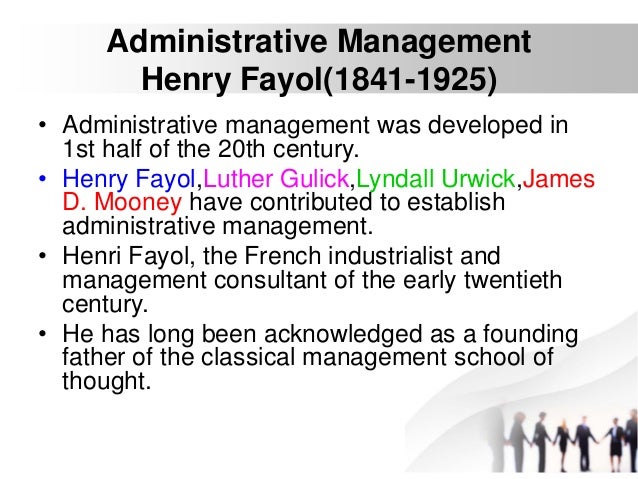

Now, I'd probably call it old-fashioned yet not obsolete. When it was written, it was probably modern. The book was quite amazing mainly for it's relevance today. The last chapter covers the skill needed of personnel and the need for management education. The principles are: 1) Division of Work, 2) Authority and Responsibility, 3) Discipline, 4) Unity of Command, 5) Unity of Direction, 6) Subordination of Individual Interest to General Interest, 7) Remuneration of Personnel, 8) Centralization, 9) Scalar Chain, 10) Order, 11) Equity, 12) Stability of Tenure of Personnel, 13) Initiative, and 14) Esprit de Corps (alignment). I believe these principles were the first in the original version of the book. The next chapter consists of the fourteen principles of management. Each of the chapters dive into the particular management responsibility, for example, the organizing chapter dives quite deep in the organizational chart, how it works and why it is created.


The next five chapters are the five responsibilities of management: Planning, Organizing, Coordinating, Commanding and Controlling. After this Fayol introduces the five responsibilities of management. The last function is the management function, which is the only one that usually doesn't have it's own department but is interwoven in the other departments. The next chapter defines the six standard functions of an organization and their definition. The first chapter doesn't and it is an introduction chapter that defines several schools of management after which it explains the re-organization of the book. The book consists of 9 chapters of which 8 come from Fayol's original book. For example, I wouldn't expect a book written in 1916 talk about MIS systems. Unfortunately, the small additions by Irwin Gray annoyed the hell out of me as the sentences he added were mostly pretty obvious and didn't improve the text. This translation of Fayol's original work by Irwin Gray is a re-ordering and slight editing of the original. It is astounding and also very sad that so little has changed. It is amazing how much of Fayol's things you can see in today's organization, especially considering the book is nearly 100 years old. Englisch.Henri Fayol's General and Industrial Management is one of the foundation works on modern management. Control (French: controler: in the sense that a manager must receive feedback about a process in order to make necessary adjustments and must analyze the deviations) 142 pp. He proposed that there were Six primary functions of management and 14 principles of management: 1. Fayol's work was one of the first comprehensive statements of a general theory of management. Since that time, Fayol's theoretical contributions have been widely recognized and his work is considered as fully important as Taylors. until Constance Storrs' English translation, reproduced in this edition. This work, published in French in 1916, was practically ignored in the U.S. While Frederick Taylor was tinkering with the technology employed by the individual worker, Fayol was theorizing about all of the elements necessary to organize and manage a major corporation.
Henri fayol general and industrial management full#
Full facsimile of the original edition, not reproduced with Optical Recognition Software. nach der Bestellung gedruckt Neuware -2013 Reprint of 1949 Edition. Control (French: controler: in the sense that a manager must receive feedback about a process in order to make necessary adjustments and must analyze the deviations).


 0 kommentar(er)
0 kommentar(er)
